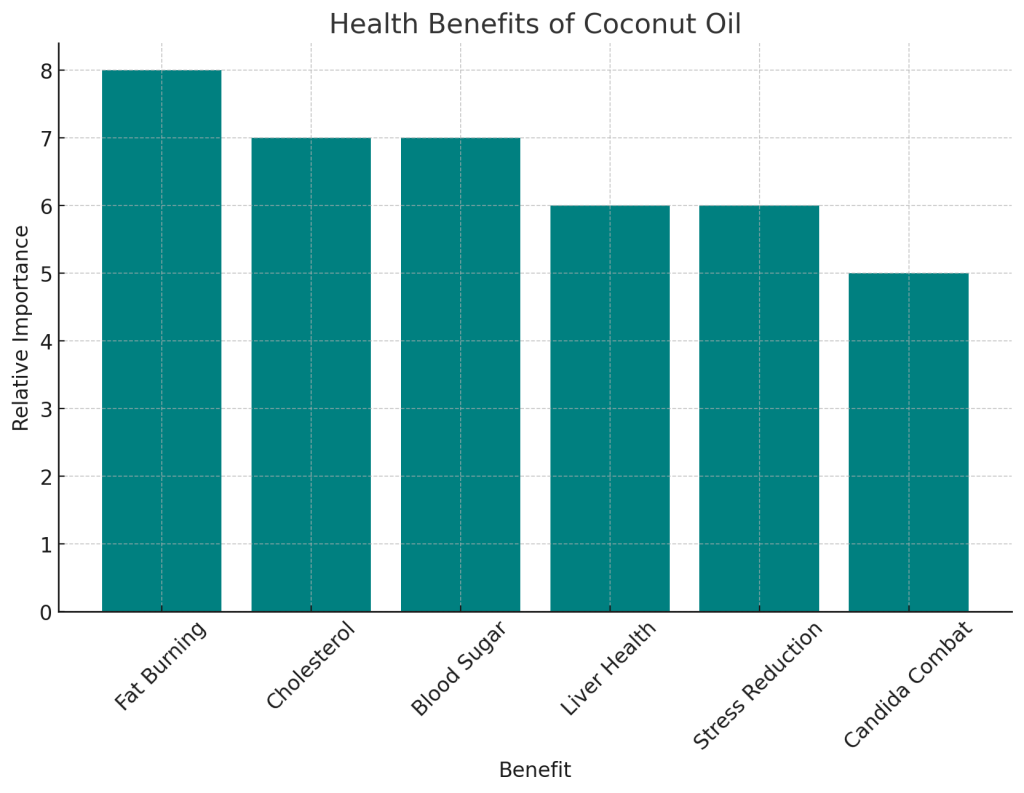Exploring the Effects of Rubbing Coconut Oil on Your Stomach
Key Takeaways Table
| Aspect | Detail |
|---|---|
| Main Focus | Rubbing Coconut Oil on Stomach |
| Potential Benefits | Accelerated Fat Loss, Increased Energy |
| Application Process | Warm Oil, Apply for 20-30 minutes daily |
| Health Benefits | Enhances Skin Health, Increases Good Cholesterol, Controls Blood Sugar |
| Necessary Adjuncts | Diet and Exercise |
| Long-term Effects | Potentially Reduces Belly Fat with Diet and Exercise |
Coconut oil has gained significant attention for its diverse health benefits, ranging from enhancing skin and hair health to potentially aiding in weight loss. A recent trend that has been under the spotlight is the practice of rubbing coconut oil on the stomach to lose fat, particularly stubborn belly fat. This method has stirred interest and curiosity, leading to various claims and research studies.
What is Coconut Oil?
Derived from the copra or the white fleshy part of the coconut, coconut oil is high in vitamin E, fatty acids, and certain saturated fats. These chain fatty acids have been shown to aid in fat burning and provide a quick energy boost to both the brain and the body.
The Role of Medium-Chain Triglycerides (MCTs)
Coconut oil contains a fair number of medium-chain triglycerides (MCTs), which are processed differently in the body compared to long-chain triglycerides (LCTs) commonly found in other fats. MCTs are rapidly absorbed and transported to the liver, where they are converted into ketones. Ketones are substances that can have various health benefits, such as increasing mitochondrial production, preserving muscle mass, and potentially preventing diseases like cancer and Alzheimer’s.
Health Benefits of Coconut Oil
Coconut oil has been associated with various health benefits:
- Increases Good Cholesterol: It raises high-density lipoproteins (HDL) in the blood, which can help reduce bad cholesterol levels, thus promoting cardiovascular health.
- Controls Blood Sugar and Prevents Liver Disease: Studies suggest that MCTs in coconut oil help preserve insulin sensitivity and prevent liver disease, particularly with high-glucose diets.
- Skin and Oral Health: Regular application enhances the skin’s protective barrier against diseases and acts as an anti-inflammatory agent. It is also used in oil pulling, a technique beneficial for oral health.
Rubbing Coconut Oil on the Stomach: A Weight Loss Technique
The technique involves warming up coconut oil and massaging it into the stomach for about 20 to 30 minutes daily. This process is believed to help the oil penetrate the skin layers and target fat cells. However, it is crucial to note that this method alone is unlikely to produce significant weight loss. It should be used in conjunction with a balanced diet rich in protein and fiber and a regular exercise routine. Exercises focusing on cardio and abdominal muscles, coupled with a healthy diet, can make this remedy more effective.
Additional Health Benefits of Coconut Oil
Apart from its potential role in reducing belly fat, coconut oil offers a spectrum of health benefits that are worth noting:
- Promotes Fat Burning: Coconut oil is a rich source of MCTs, which may help in burning fat. This is particularly significant since these fats have a different metabolic pathway compared to other types of fats, leading to enhanced fat burning.
- Improves Cholesterol Levels: The fatty acids in coconut oil can increase good HDL cholesterol in your blood, which is beneficial for heart health. This can potentially lead to a reduction in bad LDL cholesterol levels.
- Helps Control Blood Sugar: MCTs found in coconut oil may aid in maintaining insulin sensitivity, which is crucial for controlling blood sugar levels. This can be particularly beneficial for people with diabetes or those at risk.
- Prevents Liver Disease: The ketones produced from MCTs have been associated with the prevention of liver disease, especially in the context of a high-glucose diet.
- Reduces Stress and Fights Candida: Virgin coconut oil has antioxidant properties and may be effective in treating depression. It has also shown potential in combating Candida albicans, a common cause of fungal infections.

Usage and Safety of Coconut Oil
Understanding the right way to use coconut oil and recognizing any potential risks is essential:
- Shelf Life: Unrefined coconut oil generally lasts 2-3 years. It is important to use the oil within this timeframe to avoid the risks associated with expired coconut oil, such as rancidity and bacterial contamination.
- Application for Skin Health: Regular application of coconut oil on the skin can improve its function as a protective barrier against diseases and infections.
- Oral Health through Oil Pulling: Some people use coconut oil for oil pulling, which can improve oral health by reducing cavity development and maintaining a healthy balance of mouth bacteria.
- Safety in Consumption and External Use: Coconut oil is generally safe for external use if there are no signs of spoilage. However, caution should be exercised when using it for cooking, especially at high temperatures.
Incorporating Coconut Oil in a Healthy Lifestyle
To maximize the benefits of coconut oil, both for weight loss and overall health, it’s important to integrate it into a holistic lifestyle approach. Here are some additional considerations:
- Balanced Diet: Incorporate coconut oil into a balanced diet. This includes consuming a variety of nutrients from different food sources, focusing on whole grains, lean proteins, fruits, vegetables, and healthy fats.
- Regular Exercise: Complement the use of coconut oil with regular physical activity. Cardiovascular exercises, strength training, and flexibility workouts contribute to overall health and can aid in effective weight management.
- Stress Management: Given coconut oil’s potential role in reducing stress and aiding in the treatment of depression, incorporating stress management techniques like meditation, yoga, or deep breathing exercises can be beneficial.
- Hydration: Maintain adequate hydration. Water is essential for overall health and can enhance the benefits of a healthy diet and exercise regimen.
- Sleep: Ensure sufficient sleep. Quality sleep is crucial for the body’s recovery and maintaining a healthy metabolism.
- Consultation with Healthcare Providers: Before making significant changes to your diet or lifestyle, including the regular use of coconut oil for health purposes, consult with healthcare professionals to ensure it’s safe and appropriate for your individual health needs.
Summary Table: Integrating Coconut Oil into a Healthy Lifestyle
| Lifestyle Aspect | Recommendations |
|---|---|
| Diet | Balanced diet with coconut oil, whole grains, lean proteins, fruits, and vegetables |
| Exercise | Regular physical activity including cardio, strength, and flexibility workouts |
| Stress Management | Techniques like meditation, yoga, or deep breathing exercises |
| Hydration | Maintain adequate water intake |
| Sleep | Ensure sufficient and quality sleep |
| Healthcare Consultation | Seek professional advice before significant dietary or lifestyle changes |
Conclusion
The application of coconut oil on the stomach, combined with a holistic approach encompassing a healthy diet, regular exercise, stress management, adequate hydration, and sufficient sleep, can potentially contribute to weight loss and overall well-being. However, it’s crucial to understand that coconut oil is not a standalone solution and should be used as part of a broader health and wellness strategy.

